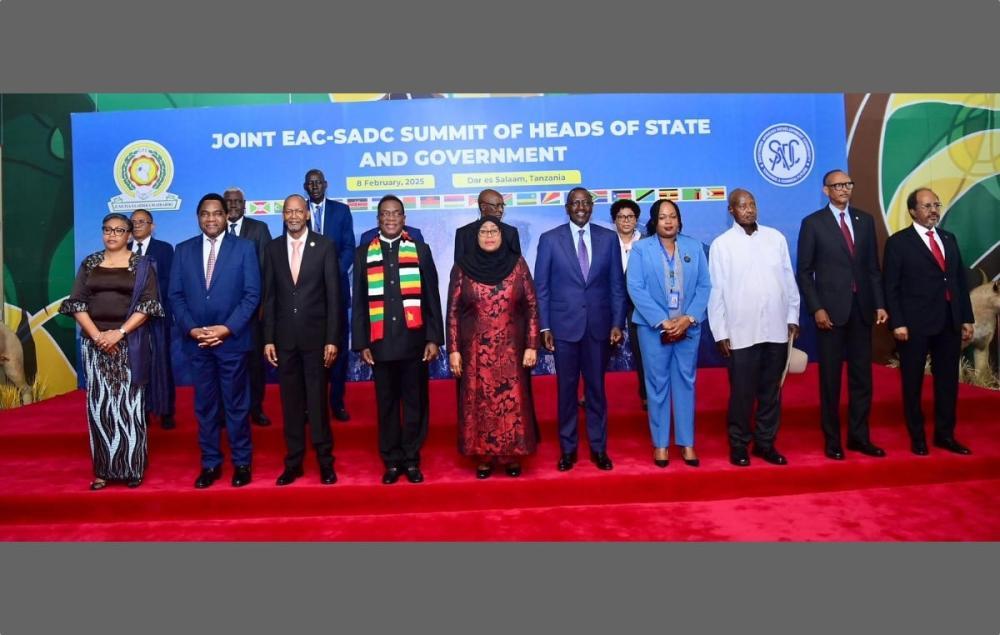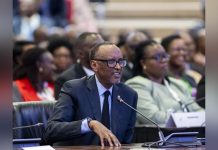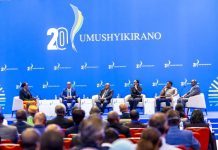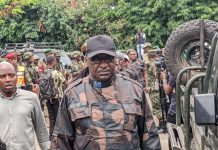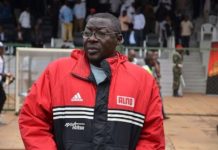Africa-Press – Rwanda. An immediate cessation of hostilities and taking positive action to allow meaningful dialogue so as to end the escalating insecurity in eastern DR Congo was the main call made in opening remarks by leaders attending the extra-ordinary joint EAC-SADC Heads of State and Government meeting held in Dar es Salaam, Tanzania, on Saturday, February 8.
With the security situation in eastern DR Congo as the main agenda, leaders emphasised that the security of the vast country is essential for its stability and development in addition to the prosperity and cohesion of regional countries.
It is the first time the two regional economic communities came together as a testament of the seriousness of the challenge they face as regards the escalating insecurity in eastern DR Congo.
Leaders including the host, President Samia Suluhu Hassan of Tanzania, President Paul Kagame, President William Ruto of Kenya who is the EAC chairperson, President Yoweri Museveni of Uganda, President Hakainde Hichilema of Zambia, President Emmerson Mnangagwa of Zimbabwe who is also the current SADC chairperson, President Hassan Sheikh Mohamud of Somalia, and Amb. Moussa Faki Mahamat, the African Union Commission (AUC) Chairperson, and Veronica Nduva, the EAC Secretary General, were in in Dar es Salaam for the meeting, on Saturday.
The government of Burundi was represented by Gervais Ndirakobuca, the Prime Minister of Burundi. Congolese President Félix Tshisekedi, whose country is the main focus of the meeting, attended the meeting virtually.
‘History will judge us harshly if we remain still’
During the official opening ceremony, Tanzanian President Hassan said the impact of the eastern DR Congo conflict has transcended borders, creating far reaching effects in neighbouring countries.
She said: “As regional leaders, history will judge us harshly if we remain still and watch the situation worsen day by day. And in line with the principle of African solutions to African problems, our countries have a collective responsibility to ensure that we urgently address the existing insecurity challenges that have heavily impacted the wellbeing of innocent civilians.”
Despite the woven complexity of the matter they are dealing with, the Tanzanian president urged her colleagues to remain resolute in their quest to address existing security challenges in eastern DR Congo.
Ruto told his counterparts in both regional blocs that the worsening security situation in eastern DR Congo calls “for our immediate, collective, and sustained attention.”
The recent escalation of hostilities in Goma, the capital of DR Congo’s North Kivu Province, and neighbouring areas, he said, is a stark reminder of the increasing fragility the situation presents and that “only collective action to facilitate a negotiated solution will offer relief.”
WATCH: “The recent escalation of hostilities in #Goma and surrounding areas is a stark reminder of the situation’s growing fragility. Only collective action toward a negotiated solution will bring relief.”
— President William Ruto, EAC Chair, at the EAC-SADC Joint Summit. pic.twitter.com/OXYcqwLnW2
— The New Times (Rwanda) (@NewTimesRwanda) February 8, 2025
Ruto reiterated a call to the parties to the “tragic conflict” – the AFC/M23 rebels and the Congolese army coalition – to immediately cease hostilities and take positive action to allow meaningful dialogue aimed at the restoration of stability.
“An immediate ceasefire is the only way by which we can create necessary conditions for constructive dialogue and implementation of a comprehensive peace agreement.”
The EAC chairperson stressed that the lives of millions of people depend on the leaders’ ability “to navigate this complex and challenging situation with wisdom, clarity of mind, empathy for the millions whose lives and livelihoods have been plunged into uncertainty.”
He also called upon the international community to step up and do its part in supporting regional efforts in delivering for the DR Congo.
‘Clandestine international dimension at work’
It is clear, he said, that the conflict in DR Congo is complex, delicate, protracted, and involves multiple actors pursuing differing interests.
He said: “The issues at stake span a wide historical, economic, and political spectrum run back in time for many decades and spill across national and regional borders. There is also a clandestine international dimension at work, whose persistent cynical and destructive effects must neither be underestimated or ignored any longer.
“For this reason, it is equally clear that such a conflict cannot be resolved through military means.”
Ruto said that the leaders have to agree that only a comprehensive diplomatic approach “that addresses the root causes of the crisis, secures the historical integrity and territorial integrity” of DR Congo and affirms the sovereignty of its people and their aspirations for freedom, justice and development is what will help establish enduring peace in the vast lawless country.
In his opening remarks, the SADC chairperson said that the two regional blocs’ historic summit is testament “to our shared commitment to the founding values of the African Union.”
President Mnangagwa said that such joint initiatives “must see us scale up bold and decisive actions to silence the guns on our continent, bit most immediately, implement [a] lasting solution to the escalating conflict” in eastern DR Congo.
“We must remain as solidly united as we were during the struggle for complete emancipation and independence for Africa from colonialism. We must have a duty and a collective responsibility to comprehensively, frankly, tackle and address the various challenges that are impeding the realisation of peace and security for the people of eastern DR Congo.”
After the official opening ceremony concluded, the leaders started closed-door deliberations.
The EAC deployed troops to eastern DR Congo in November 2022 to support regional efforts to restore peace in the troubled region. At the time, M23 rebels had made large gains, capturing swathes of territory in areas bordering Rwanda and Uganda in North Kivu Province. M23 is now a member of a larger rebel coalition, Alliance fleuve Congo (AFC), created in December 2023 in Kenya’s capital Nairobi.
The AFC says it is fighting for governance that supports basic human rights, secures all citizens, and addresses the root causes of conflict. Its leaders have vowed to uproot tribalism, nepotism, corruption, and genocide ideology, among other vices, widespread in DR Congo.
The East African Community regional force (EACRF), with troops from Kenya, Burundi, Uganda, and South Sudan, was able to create a conducive environment for peace to prevail by having M23 withdraw to designated areas and maintain a ceasefire between the rebels and the Congolese army until its breach in October 2023, something that reversed the gains that had so far been realised.
Soon after deployment, however, Tshisekedi was critical, threatening to expel the regional force from his country. The EAC regional force which derived its mandate from Chapter 23 of the EAC Treaty and the EAC Protocol on Peace and Security, had a hard time in eastern DR Congo, ever since its deployment. After EACRF’s exit, Tshisekedi welcomed troops from the Southern African Development Community (SADC), or SAMIDRC, to battle the rebels. From then on, instead of getting better, the security situation in eastern DR Congo, worsened.
Reports that the latter actually collaborated not only with the Congolese army but also with militias like FDLR, a DR Congo-based terrorist militia founded by remnants of the masterminds of the 1994 Genocide against the Tutsi in Rwanda, and European mercenaries in fighting the AFC/M23 rebels further complicated the situation.
Kinshasa wanted the EAC regional force to battle the M23, which was not part of the latter’s operational mandate. EAC’s troops begun withdrawing from DR Congo, in early December 2023, just over a year after they were deployed to support peace efforts for the country’s conflict-ridden eastern DR Congo.
The EAC-led Nairobi process takes in the fact that the insecurity in eastern DR Congo pre-dates 1994, when a genocide against the Tutsi in Rwanda claimed more than one million innocent lives, and was exacerbated by the retreat of defeated genocidal forces into eastern DR Congo where they regrouped to cause instability in the region.
For More News And Analysis About Rwanda Follow Africa-Press

